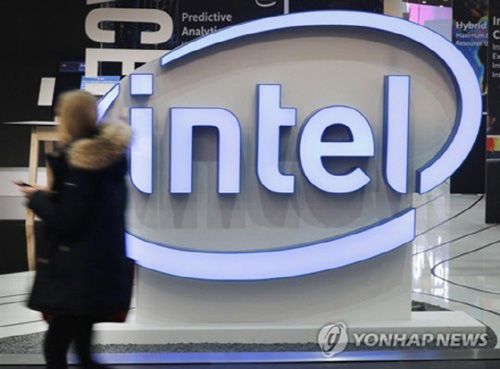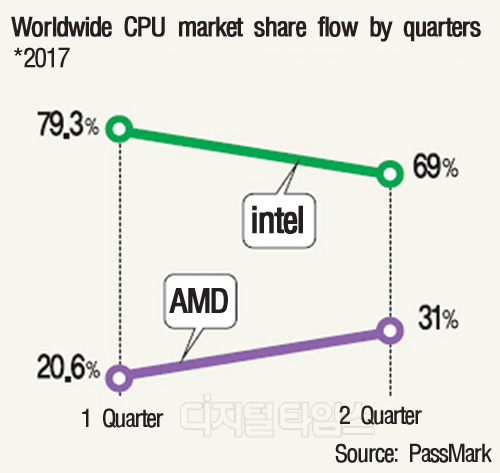Intel in challenge in mobile chip, trouble in CPU market too
Park Seul Gee | seul@ | 2017-10-12 11:29:06

[Photo] Yunhap news

Intel`s shades, which have kept the semiconductor industry `throne` for the past 25 years, are falling apart now. Although the semiconductor market is shifting from PC to mobile, Intel is still weak in the smartphone parts market and is also on the downhill for the PC CPU market.
Especially, Intel, which posted a top spot in semiconductor sales for Samsung Electronics in the second quarter, is still out of business due to the declining PC use.
According to market researcher IHS Markets on October 11, Intel has been at the bottom of the list with a 5.3% market share in mobile system semiconductors (logic chips) market including application processors (AP) and communication chips last year. Until 2013, it was the 4th place in the market. However, Apple, China`s high-silicon technology, and China`s Media Tech have all been dropped. Moreover, the difference in market shares with China Tsinghua Unic Group, which ranked 8th, has narrowed to 1.7%.
Therefore, Intel is facing a challenge to reduce its dependence on sales in the stagnant PC market, but its influence is declining sharply due to its lack of performance. According to market researcher Gartner, PC shipment this year is estimated to be 260 million units, down 3% from last year, but smartphone shipments are expected to increase 5% to 1.6 billion units.
In line with this trend, Intel has attempted to reorganize its business structure around mobile chips, but it has not succeeded. Earlier in August 2010, Intel acquired Infineon`s mobile phone chip business (WLS), a German semiconductor manufacturer that supplied modem chips to the first generation of the iPhone to expand its mobile market. However, its competitiveness, Qualcomm`s share, fell to less than 1% in this market and profitability deteriorated rapidly.
Samsung Electronics, a big-time customer, developed its own mobile system-on-chip (SoC) "EXINOS", which integrates a mobile AP and a communication modem into a single chip, and installed Intel`s premium smartphones such as the Galaxy S7. As a result, Intel withdrew its SoC business for smartphones in May last year.
Intel, which has failed to respond to the mobile market, is also threatened by the CPU market, which has established its solo system. AMD, the No. 2 CPU maker in the US, is rapidly ramping up its market share with the Laizen series launched earlier this year. According to Passmark, AMD`s share of the global CPU market is estimated to have reached 31 percent in the second quarter from 18.1 percent in the fourth quarter of last year. The share of Intel in the same period decreased by 12.9 % points from 81.9% to 69% .
Meanwhile, Intel`s CPU performance is not as fast as the consumer wants, according to experts. According to Toms Hardware, Intel`s Core i9 7900X, which is compatible with AMD`s Rizen, has better CPU performance than the CPU, but the program and game performance are lower than the Rizen or i7 in some cases, Respectively. Intel was not able to achieve the same results in the PC and server CPU market and mobile semiconductor market. The company is investing in future businesses such as automotive semiconductors and 5th generation (G) mobile communication chips, but it is too early to make such a profit right now. "If Intel fails in the mobile market and fails in the mainstream new businesses like Internet, 5G, etc., it will disappear," an industry expert said.
By Park Seul Gee seul@
